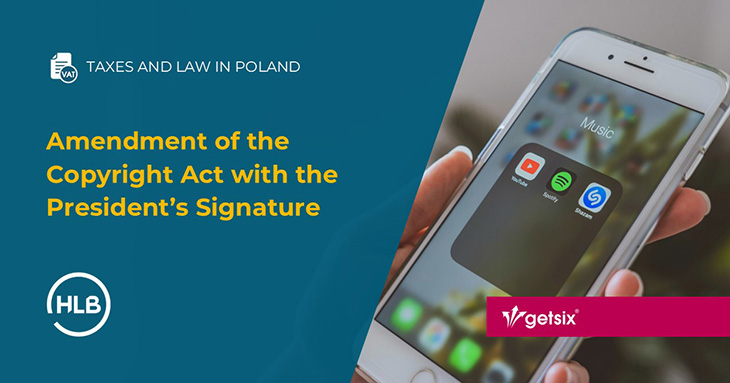Amendment of the Copyright Act with the President’s Signature
On August 14, President Andrzej Duda signed a major amendment to the Copyright and Related Rights Act, which marks the most substantial changes in this area in 30 years. These changes adapt the Polish legal framework to the current challenges of the media, arts, and culture market and implement EU directives on copyright and the digital use of content.
The amendment grants creators and performers of audiovisual, literary, journalistic, scientific, musical, and spoken-word works the right to appropriate compensation for making their works and performances available online. In addition, it allows them to negotiate their compensation rates.
Implementation of EU Directives
The purpose of this amendment is to ensure the consistency of Polish law with the directives of the European Parliament and Council (EU) from April 17, 2019:
- Directive 2019/789, referred to as the “Satellite and Cable Directive (SATCAB II),” which enables the broader dissemination of television and radio programs from other EU member states.
- Directive 2019/790, referred to as the “Digital Single Market Directive (DSM),” which addresses the challenges of digitization by introducing new forms of permitted use of works, related rights, and databases and modifies the forms already existing in EU law.
In order to bring Polish legislation in line with EU directives, the following legal acts have been amended:
- The Act of February 4, 1994, on Copyright and Related Rights,
- The Act of June 15, 2018, on Collective Management of Copyright and Related Rights,
- The Act of July 27, 2001, on the Protection of Databases.
The new copyright law will take effect one month after its publication in the Official Gazette, with the exception of Article 1, point 21, which will take effect six months after the date of publication.
Key Changes in the Act
Royalties for Creators and Performers
One of the key changes is to grant creators and performers new, non-transferable rights to receive appropriate compensation for making their works available online. This applies to audiovisual works and artistic performances, including VOD (Video on Demand) and music on demand. These provisions ensure that artists can receive royalties for the digital exploitation of their works, which is an essential support for their work.
The payment of royalties will be made through collective management organizations for audiovisual works, and through independent management entities or directly to the artists for other types of works.
Compensation for Press Publishers
The amendment also addresses the interests of press publishers, who have long sought fair compensation for the use of their content by digital platforms. In collaboration with representatives from the Ministry of Justice and the Office of Electronic Communications (UKE), a negotiation mechanism was introduced to determine fair compensation amounts.
In addition to the aforementioned changes, the act introduces a number of other provisions, including:
- Online Service Licenses: Simplified procedures for obtaining licenses for the use of works and related rights in additional online services offered by radio and television stations.
- Rebroadcasting of Works: Standardized licensing rules for the rebroadcasting of works, regardless of the technology used.
- Liability of Digital Platforms: Digital platforms will be required to obtain licenses or verify content for copyright infringements, a significant change in their liability for user-uploaded content.
- Uncommercial Works: Simplified access to works that are not available on the market but are in the collections of cultural heritage institutions.
- Transparency of Information: Creators and performers will have the right to regular information on how their works are being used and the income generated from them.
Conclusion
The amendment to the Copyright Act is an important step in adapting the Polish legal framework to the requirements of the digital age. It provides creators and artists with better legal protection and compensation for their work online, which is essential in today’s digital content landscape. This reform is undeniably a significant move toward a fairer distribution of profits from the use of digital content.
If you have any questions regarding this topic or if you are in need for any additional information – please do not hesitate to contact us:
CUSTOMER RELATIONSHIPS DEPARTMENT

ELŻBIETA
NARON-GROCHALSKA
Head of Customer Relationships
Department / Senior Manager
getsix® Group
***














